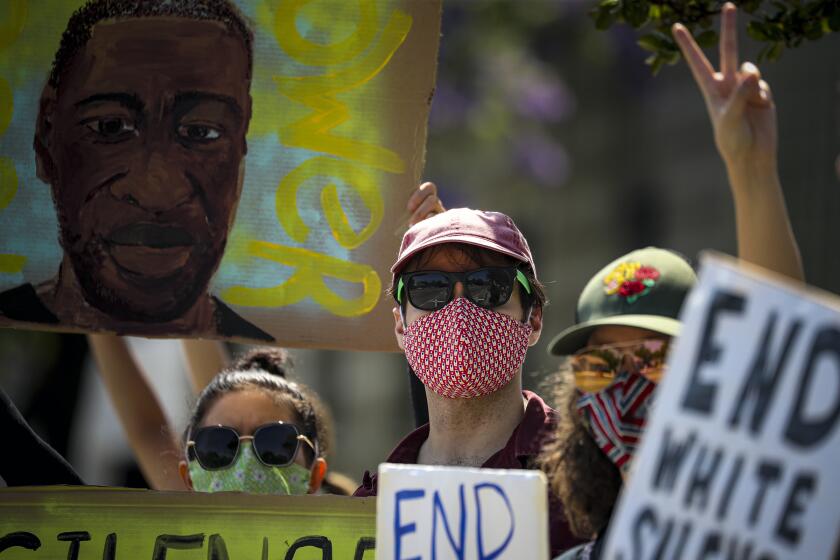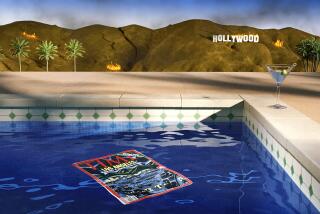How does L.A.’s racial past resonate now? #BlackLivesMatter’s originator and 5 writers discuss
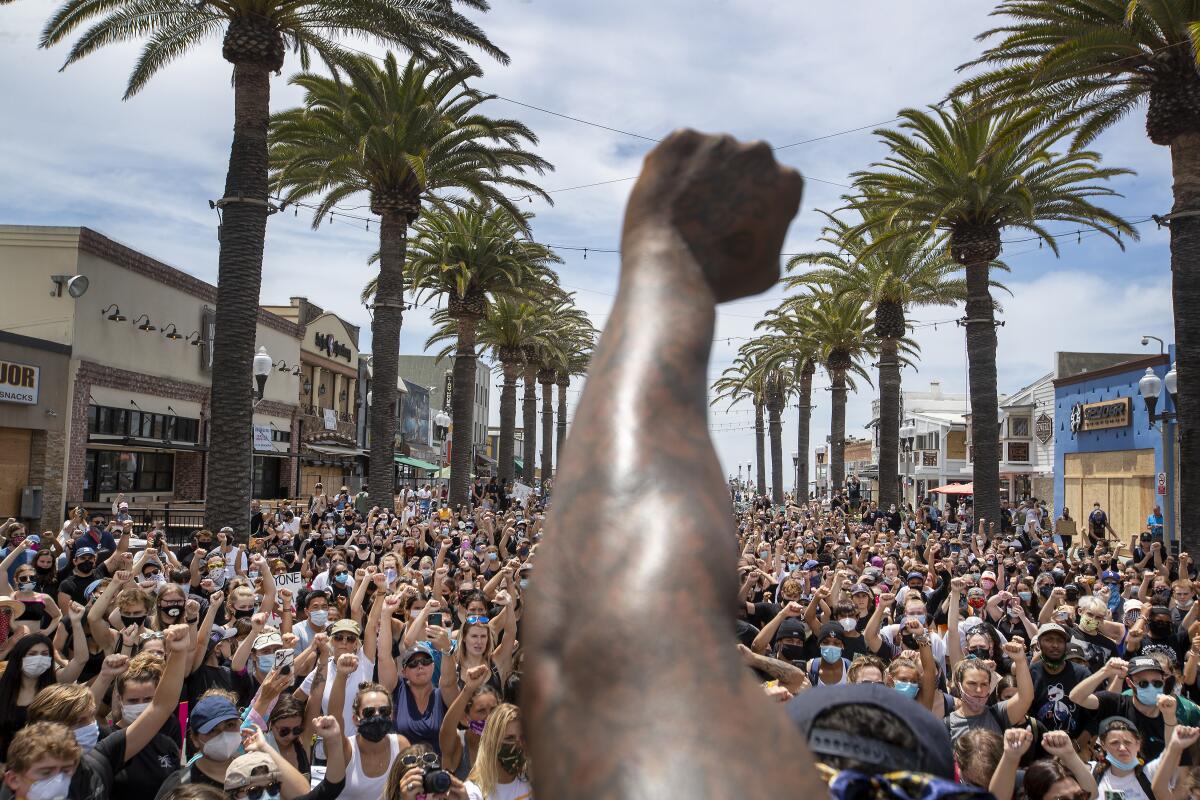
- Share via
When I coined the hashtag #BlackLivesMatter in the hot summer of 2012 (later popularized through the activism of Alicia Garza, Patrisse Cullors and Opal Tometi after Michael Brown’s death), racial healing, reparations and transformation were heavy on my mind. I had been bearing witness to the possibilities and problems of America for more than 30 years — raised amid the war on drugs, the LGBTQ rights movement, the end of the Cold War, the rise of hip-hop and the fulfillment of the prophecy of the civil rights movement as expressed through Barack Obama’s historic two terms as the country’s first black president.
I had traveled a bit myself over those years, from homelessness to a PhD, a book and a professorship at Yale. Despite the success story I seemed to represent, all I could think about was what had been lost along the way. The losses black Americans start with as they attempt to build better lives and communities are innumerable: The black people in the ocean have a story to tell beneath the waves, singing, screaming, crying, laughing, recalling the long legacy of the middle passage, the triangle trade and slavery in the Americas.
Abolished yet alive, as many activists and scholars have demonstrated, slavery in one form or another has lingered for 400 years like an untreated virus, infecting — though many claim it was wiped out by the signature stroke of Abraham Lincoln’s pen. Black people’s lives have remained vulnerable and unprotected by the very government that abolished the institution of slavery. As the planter class took its last sips of power and blood, they managed to bequeath us a century and a half of debt and devastation. Racism is their lasting hex on a country that would dare to try and outlive them, an institutionally effective death spell killing black people every day.
Enter the great pause. Coronavirus everywhere, unemployment everywhere, Zoom everywhere, masks everywhere, sirens everywhere, police everywhere, helicopters everywhere, protests everywhere. Black lives matter everywhere. Just as studies were showing that COVID-19, too, was discriminately killing black people, a video of George Floyd’s final eight minutes and 46 seconds in America exposed the untreated virus of racism. But the immune response has been robust: In the days since his preventable and untimely death, Los Angeles, like cities across the globe, has witnessed numerous multiracial, multiethnic protests with an unequivocal stance that black lives matter. At the same time, there are continued attempts by some in the media to conflate the protesters’ calls for justice and equity with the noise of the fire trucks, episodes of violence, police sirens, helicopters, bullets and broken glass.
The protests have mobilized many non-blacks who hadn’t yet been involved in racial justice causes. Black protesters say it’s a sign of the movement’s impact.
In the second week of unrest, The Times convened a panel of some of the nation’s foremost writers on Los Angeles and its racial history to sift through the damage and the hope, the violence and the love. Below is a condensed version of my Zoom conversation with Luis Rodriguez, former poet laureate of L.A.; Walter Mosley, bestselling author of the Easy Rawlins mysteries; Jean Guerrero, investigative journalist and the author of “Crux: A Cross-Border Memoir”; University of Houston professor Gerald Horne, whose many books include “Fire This Time”; and Jervey Tervalon, novelist and editor of “Geography of Rage: Remembering the Los Angeles Riots of 1992.”
As we all know, Los Angeles has a long history of racial turmoil and uprisings. How does that history figure in this current moment?
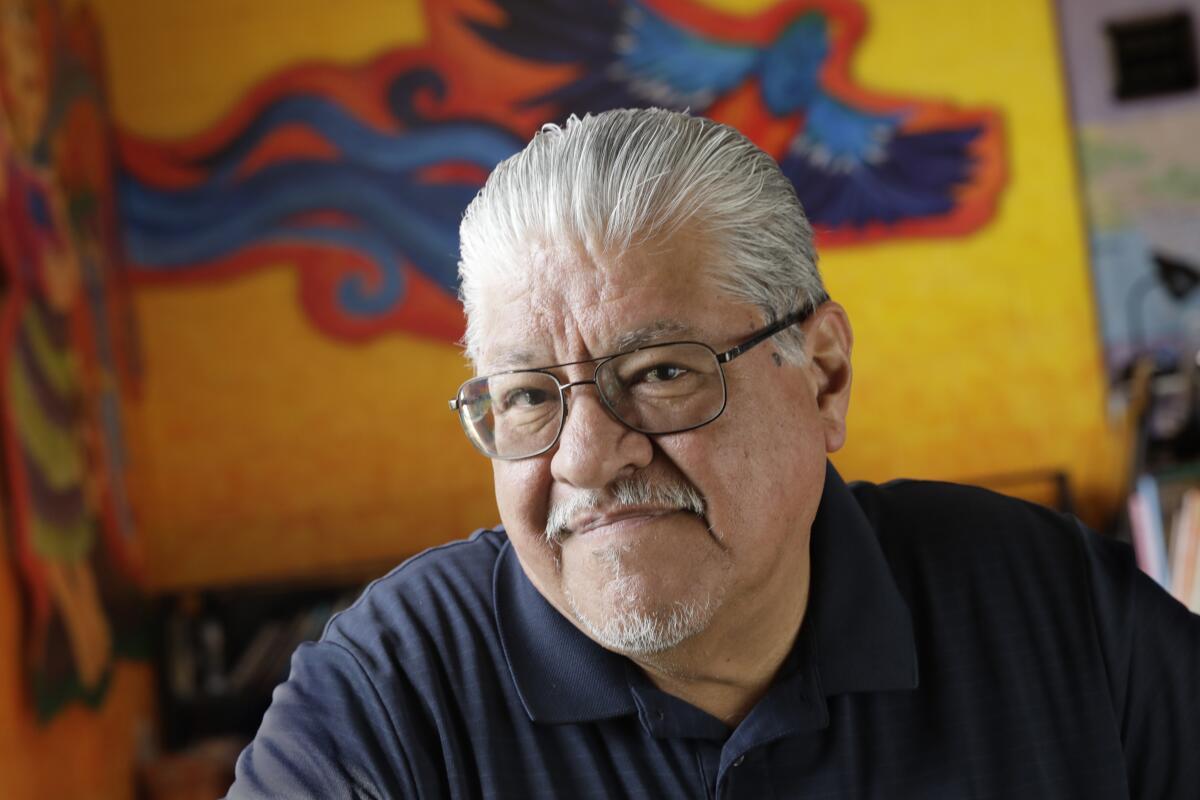
Luis Rodriguez: I was 11 years old when the Watts Rebellion happened in 1965. My family lived in Watts until I was 8, and I remember knowing what was happening and how deeply it impacted. I recall during the Chicano movement protest against the Vietnam War being attacked by the police. Three people were killed. I was arrested and held longer than anybody because they were going to falsely charge us with the murders of the people that died. What saved us was the filming that showed the police beating our people, including the reporter Ruben Salazar. [Salazar, a Times columnist and the news director of television station KMEX, was killed in 1970 by a gas canister shot by a sheriff’s deputy.]
Walter Mosley: I was there at the first uprising in ’65 and later after the Rodney King decision. ’65 was a moment where the black and brown coalition split, but over that time and up until now, more and more I see white people, black people, brown people coming together and saying: This is wrong! And we see why it’s wrong!”
Jervey Tervalon: I was teaching high school when the [Proposition] 187 bill was on the ballot, and we were told that we would need to determine which students were illegal immigrants and identify them. It was like they were conscripting me in this racist endeavor, and I was thinking, “I’m not going to do that! You’re not even trying to pay me.” That was the beginning of the end of the Republican Party in California.
Jean Guerrero: Then and now, black lives and brown lives go hand and hand. Take some interesting parallels between what’s happening right now nationally and what happened in the ‘90s in Los Angeles. You had police brutality against Rodney King and at the same time unprecedented assaults against immigrants, as demonstrated by Pete Wilson referring to “invasion at the border.” Presently, policies are tearing apart families at the border and using the pandemic to close completely to asylum-seeking — at the same time that you have the police brutality against George Floyd. Here again we see parallels of oppression.
Gerald Horne: In terms of the history of lynching and policing killings, the fundamental question is: Why black people? Why are they dramatically and disproportionately overrepresented and misrepresented? If we go to 1776, as I have, what you find is that the United Kingdom had moved toward the abolition of slavery and that the American slave owners, led by real estate speculator No. 1 George Washington, were reluctant to move in the direction of abolition, premising the entire business model of American colonization on dispossession and the labor of enslaved African people. The Negroes (as they were called then) did not support the settlers in the particular project, which is a problem today: A culture grew wherein black people are treated like rebellious Africans, criminals in waiting. Unless you understand that history, you cannot understand what’s happened in recent years or in Minnesota a few days ago.
I find remarkable the recent shift by a number of public officials who have been unapologetic and explicit in emphasizing injustice and brutality plaguing black people. What does this shift mark for you?
Guerrero: The fact that this is gaining traction in our media and even among our politicians makes me optimistic. One of the things that makes me most optimistic is that finally, after so many years of being told that we couldn’t use the word “racist” or “racism,” that we have to be extremely careful about ever offending anyone with that word — that was revoked in the newest Associated Press Style Manual. We still think it’s imperative for journalists to be impartial, but with identifiable racists acts we are finally allowed to call it racist. It’s upsetting that it took that long.
Horne: I’ve realized myself that there has been a shift, a small shift, from journalists saying we need to have a conversation on race to [saying] we need to have a conversation about racism. We need a conversation about the terrible reality of racism as opposed to the social construction that is race. One of the determining factors which will point to where this goes as a movement, or a moment, has to do with BLM and its decentralized nature. When you have centralized organizations, calling in the experience of the Black Panther Party, the starting point is a shootout that does not end very well for BPP. Centralized organizations tend to be bludgeoned into submission. The problem with decentralization, of course, is that it becomes difficult to plan. You tend to rely more on spontaneity. It becomes difficult to confront a centralized state.
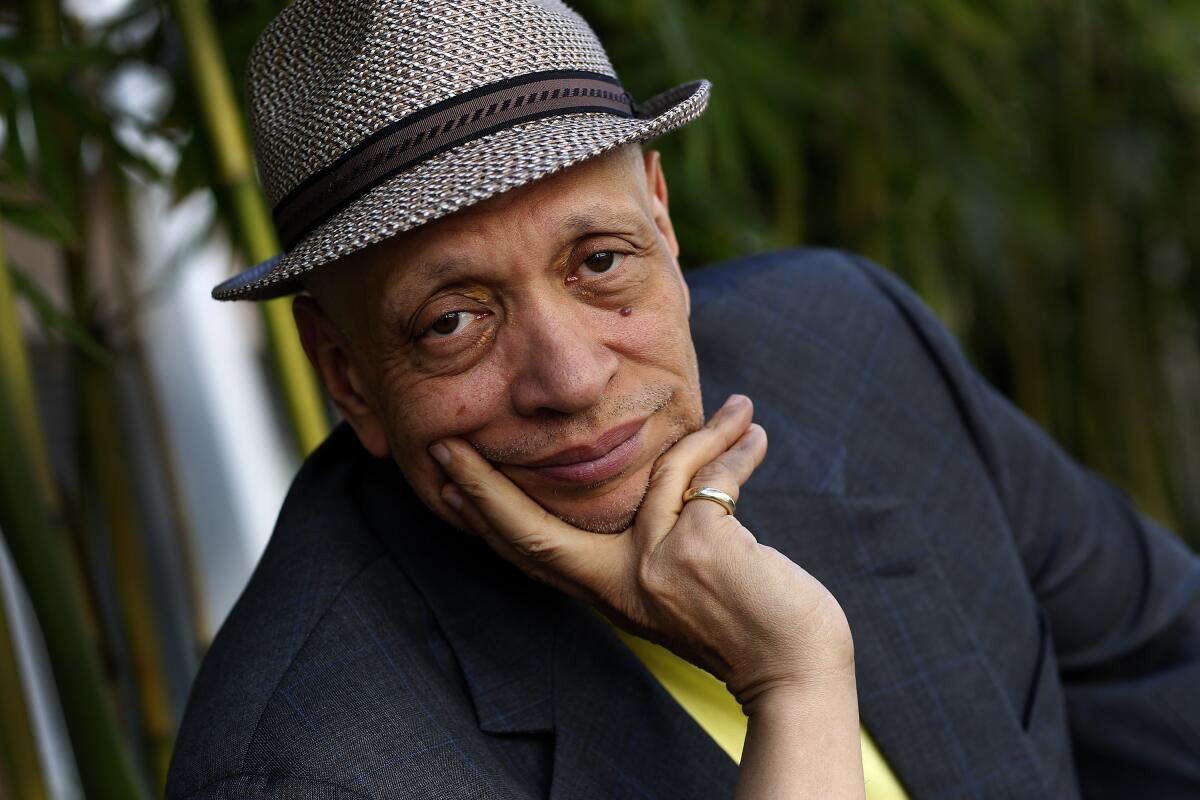
Mosley: Today there seems to be a desire for a different kind of organization, where [it] is not black people or brown people or people with penises. It’s not that — it’s that we have a commonality. I think there are a lot of young people who know it, not necessarily have articulated it, but they start off through music and going on through people’s heroic and political history. I don’t have an answer about what the right organization would be. We believe in “us” and the “us” includes everybody.
LR: This is a transformative moment. The opportunity is there to do something that has never been done before. I’m in the Mexican and Central American communities and I get to hear what people say. The activists are very clear: Black Lives Matter. I think people really get there’s something fundamentally vital in our country that goes back to what Dr. Horne was saying, the origins of who we are. I think the reason why brown people get attacked is because they are actually representative of indigenous and native people. The first big crime was the genocide against native people, and there’s millions of indigenous people who happen to be Mexican and South American who don’t know their name. I’m trying to support the coherence in people’s voices: stay true and don’t get drowned out by not just what [President] Trump says, but what other people say about looting.
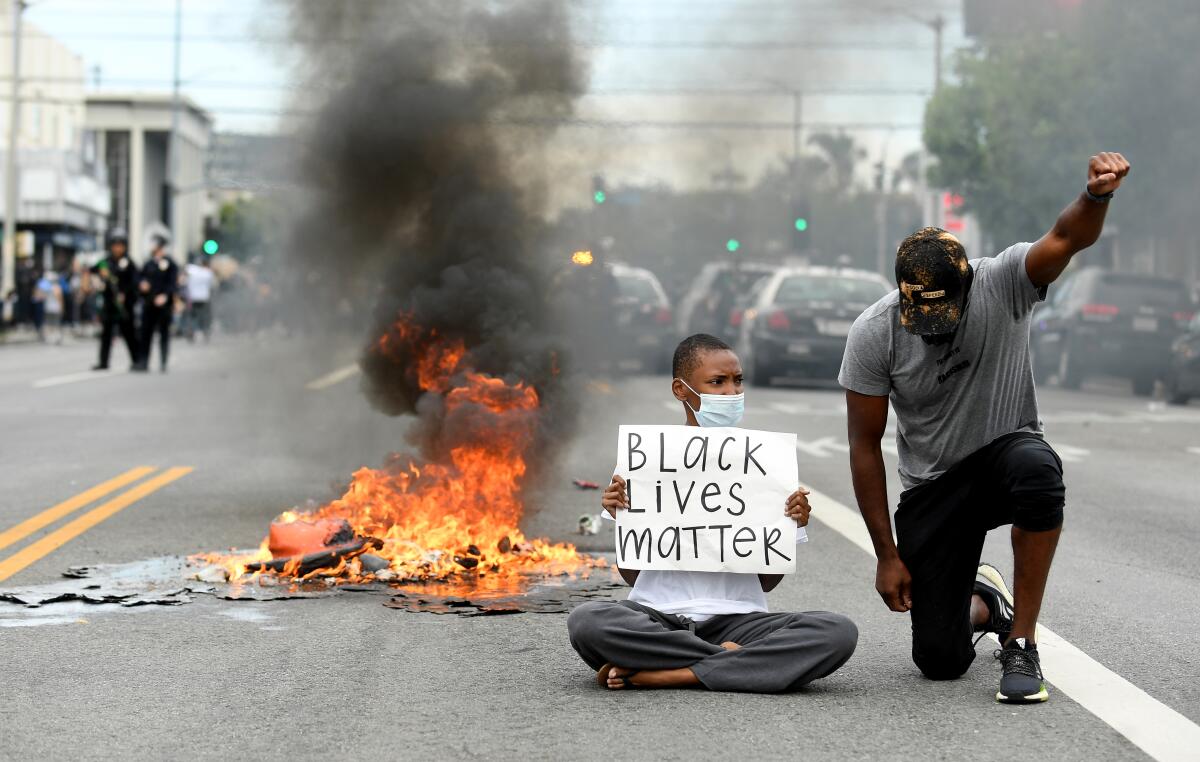
Tervalon: Meanwhile Trump is just incoherent, and I think he only seems interested in accumulating power, but he doesn’t seem to know what to do with the power because he is too lazy and self-indulgent. His incoherence is enabling us to become coherent.
Horne: Since January 2017 his popularity ratings have been hovering in the 40s. If that number dips into the 30s, I will tend to feel that he will be defeated in November as a result of what’s going on today.
I see so much of what has unfolded as an opportunity to also think about the role of love. Isn’t the wearing of a mask or the putting up of a sign for racial justice an expression of love for someone else?
Guerrero: I think right now, a lot of people are having trouble loving and so they’re hating, and a lot of that is tied to the fact that we have this disinformation pandemic. People who harvest our data sell it to advertisers, and then some politicians use that data to shape our purchases, our occupations, our politics. As a result, we feel this collective sense of confusion and chaos. One of the ways we can walk back toward love is to recognize we have agency, that we can be better informed.
Rodriguez: Our government keeps saying we are going to make the U.S. better. After so many years the old part is still there, but we don’t have to destroy the country or the world or the people to get there. That’s the love I hope is permeating everything we do.
Tervalon: I think of the neighborhood I grew up in, the Jefferson Park area, and the sense of community we had. I was privileged to live in this black community, and it prepared me for going on into the world because I was confident enough in myself. And sometimes I worry about kids growing up in communities where they don’t have that experience.
Horne: As I look historically, what has helped give black people momentum while being grossly outnumbered and persecuted has been international support. The fact that a number of writers in Nigeria wrote an open letter castigating the United States is major. The global attention in cities like Auckland, Sydney, London, Berlin and the fact that representatives of the African Union, El Salvador and Ethiopia are reminding U.S. representatives of the obligations to black Americans gives me optimism.
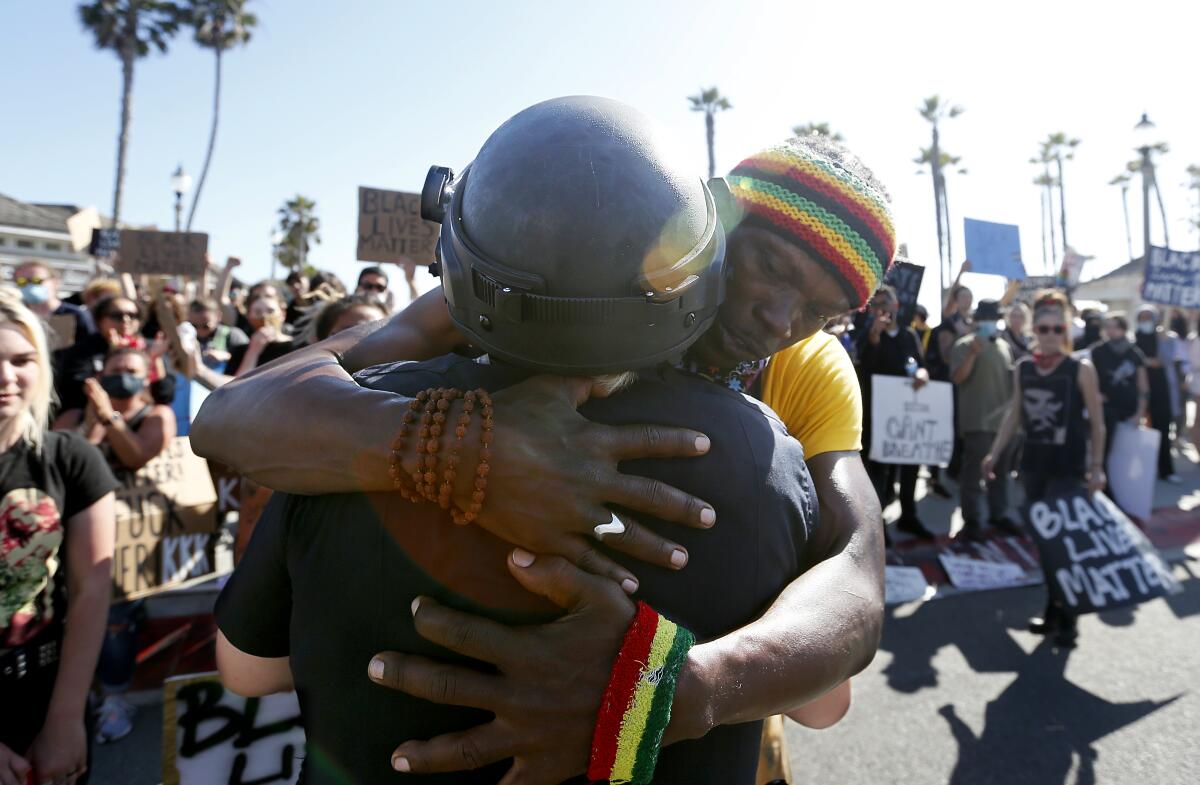
Mosley: I think this is a new moment. That even the people who are representing the government, the police, the courts are saying we have to be different. Now I’m not foolish enough to believe that what they’re saying doesn’t have its own political base, but I’m even optimistic about that — if I want to get re-elected, I have to support these people, even if I don’t like them. I’ve been thinking about writing about that.
Hunter is the Scott Waugh Endowed Chair in the Division of the Social Sciences, professor of sociology, and chair of the department of African American Studies at UCLA. He is the author of three books.
More to Read
Sign up for our Book Club newsletter
Get the latest news, events and more from the Los Angeles Times Book Club, and help us get L.A. reading and talking.
You may occasionally receive promotional content from the Los Angeles Times.
